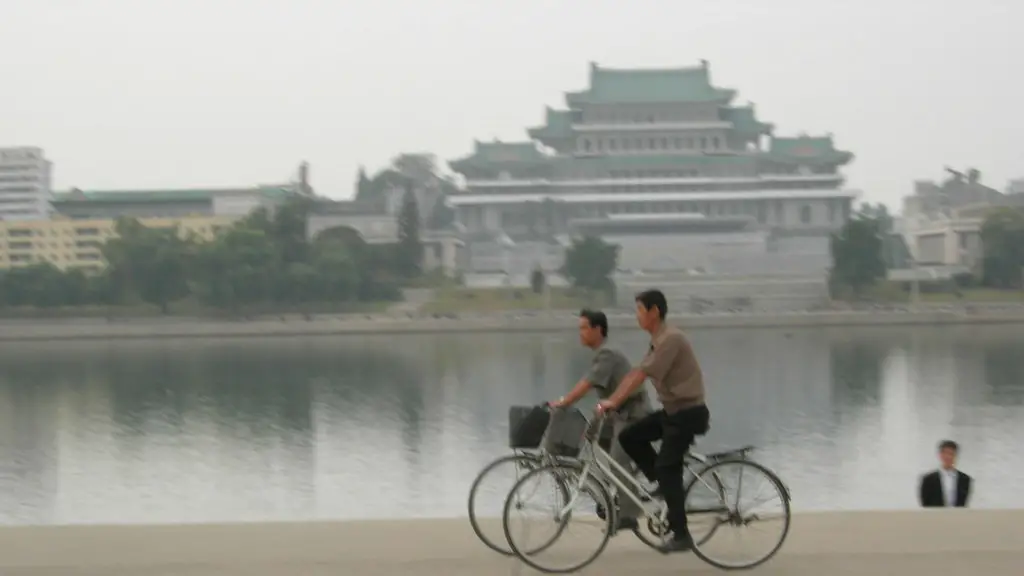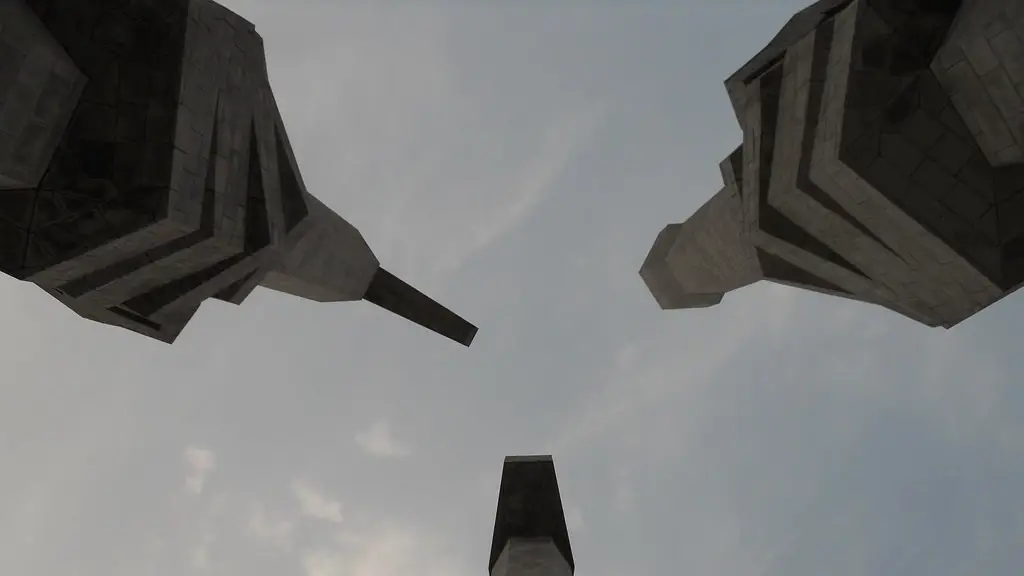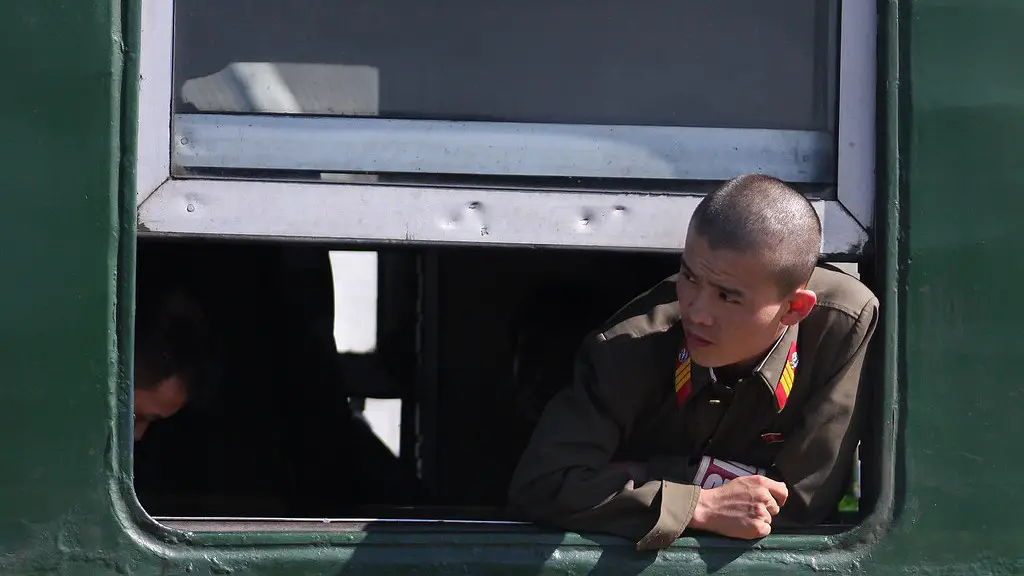Political History after Korean War
The Korean War (1950-53) between North and South Korea ended with a cease-fire, but a peace treaty was never signed. This left the two countries in a state of technical military conflict, with no diplomatic relations. The remaining decades of the Cold War saw North Korea isolated from the rest of the world, with limited diplomatic ties. After the fall of the Soviet Union, the country was left without major friendship or support. During this period, the ruling party in North Korea focused on hard line communism, and developed the “Songun” or military first policy.
The government pioneered a cult-like mentality of personality worship centered around “The Great Leader” Kim Il-Sung. The system of totalitarian rule centered around this concept controlled the lives of every one of the 24 million citizens of North Korea. This created what has been called the “Hermit Kingdom”. North Korea has maintained its isolation and support its nuclear program, with sanctions imposed by the United Nations against the country garnering international attention.
Contemporary Politics
North Korea is currently ruled by the third member of the Kim family, Kim Jong-un. He is now the de facto leader of the country, while his grandfather, Kim Il-sung, is revered as the Eternal President. Kim Jong-un has improved diplomatic relations with surrounding countries, particularly with South Korea. His policies have included some of the most drastic economic reforms in the history of the country, but this has been met with a slow progress and resistance from elements of the government. Kim has maintained a hard line stance on the nuclear and military programs, much to the dismay of the international community.
The human rights situation in the country is a major source of international criticism. Since coming to power, Kim Jong-un has made a number of public executions of high ranking members of the government for being perceived as a political threat. There have been reports of torture and forced labour in the prison system, and the international community is urging change. North Korea continuously denies these accusations and insists that it provides a good standard of living to its citizens, despite reports of poverty and starvation.
Economic Development
The state of the North Korean economy is a major source of concern, with the economy having suffered during the earlier years of the Kim Jong-un’s reign. Korea’s Gross Domestic Product (GDP) is estimated to be around 25 to 30 billion dollars, far below its neighbours. North Korea’s coal and metal industry have been preparing for new industries, such as modern information technology, with mining and agriculture making up most of the economy. South Korea has proposed a joint economic development programmes between the two neighbouring countries but North Korea has mostly been slow to accept these initiatives.
International sanctions, imposed by the United Nations, have done little to alleviate the economic situation. The sanctions aimed to deny the country from benefiting from international trade and new technologies. This has only further deteriorated relations between North Korea and other countries, as the country continues its pursuit of developing a nuclear programme.
Foreign Relations
North Korea has been involved in a few diplomatic initiatives, with talks between the US and North Korea attempted in 2018 and 2019. Unfortunately, the efforts were not successful and North Korea has continued to pursue nuclear weapons and ballistic missile tests.
North Korea and South Korea have made some movement to reduce tension and cooperate with one another, but mistrust remains. North Korea has not been shy about its focus on development of a nuclear weapons programme, and some sources suggest that North Korea has already developed up to 20 nuclear warheads. United Nations sanctions against North Korea have become increasingly stringent, as the country continues to carry out missile tests with no sign of providing transparency.
International Security
The most pressing international concern is what is seen as the destabilizing effect of North Korean nuclear missile tests. It marks a clear challenge to the international community’s effort to maintain a nuclear-free Korean Peninsula. North Korea is the only country on the United Nations Security Council to not be a signatory of the nuclear Non-proliferation Treaty.
North Korea also boasts of its powerful cyberprogramming capabilities, claiming responsibility for a number of high profile attacks. Questions over the safety and reliability of the country’s nuclear arms program have been raised by experts following these cyberattacks, as well as the potential of cyber-espionage to collect valuable intelligence on their adversaries.
Regional Relations
The relationship between North Korea and China has been traditionally strong, with China offering diplomatic, economic, and technical support for the country. China has served as the main economic partner for North Korea, with both countries generally maintaining good relations until recently. In recent years, tensions between the two countries have arisen due to North Korea’s refusal to accept Chinese economic reform plans and its continued development of nuclear weapons.
The relationship between North Korea and its other neighbouring countries, South Korea and Japan, is more complicated. Despite North Korea’s pursuit of nuclear weapons, both South Korea and Japan have consistently expressed interest in pursuing diplomatic dialogue with North Korea. Recently, South Korea and Japan have shown an increased willingness to cooperate with North Korea in order to promote regional stability and peace. However, these efforts have been largely stymied due to North Korea’s refusal to re-open the Six-Party Talks, a stalled diplomatic initiative between North Korea and the other five major regional powers.
Propaganda and Ideology
Propaganda has been used by the ruling regime in North Korea to control the population for decades. The government has used the media to propagate false information in order to create a false sense of national pride and loyalty to the “Dear Leader”, Kim Jong-un. The propaganda has been successful in creating an atmosphere of fear and loyalty that has been hard to break.
The government has also been encouraged to maintain nationalistic sentiments based on the rejection of foreign goods, lifestyle, or ideas. This has been particularly effective in controlling the young population of North Korea, which continues to be subjected to a state-mandated education system.
Cultural Identity
North Korea is home to a diverse array of cultural and religious practices. Despite the oppressive regime, traditional South Korean culture remains and is still practised today. Many North Koreans maintain a sense of traditional Korean identity, with cultural artifacts such as ancient tombs, temples, and traditional gardens scattered across the country.
The country’s musical traditions are still widespread, with traditional instruments such as drum, zither, and flutes featured prominently in North Korean orchestral music. With its nationalist undertones, the music has long served as a source of cultural pride for the nation.
Societal Impacts
Despite the repressive environment, North Korea is home to a surprisingly vibrant underground culture. Underground markets are widespread, providing citizens with access to a variety of consumer goods ranging from clothing, to food, to electronics. The government has recently cracked down on these markets, but they continue to be a driving force in the country’s economic system. The markets are also a social outlet for citizens, providing a space for them to trade and engage in debate, which is otherwise strictly prohibited.
In recent years, an increasing number of North Koreans have managed to escape from the country’s oppressive environment and find refuge in neighbouring countries. In these countries, citizens are exposed to many of the ideas and media that the regime has been trying to block from entering the nation. In spite of these efforts, North Koreans have managed to maintain contact with the outside world.
International Response
The international community has responded to North Korea’s nuclear missile tests and other aggressive actions with increasing sanctions and pressure. The US, South Korea, China, Japan, and other countries in the region have united to impose economic sanctions and other measures against the North Korean government. However, these efforts have had limited success due to North Korea’s refusal to abide by United Nations resolutions.
Despite these efforts, North Korea continues to pursue its nuclear weapons development program, despite growing international criticism. Kim Jong-un has made some efforts to improve diplomatic ties with other countries, but his strategy of using nuclear brinkmanship to threaten other nations has been decried by world leaders.





